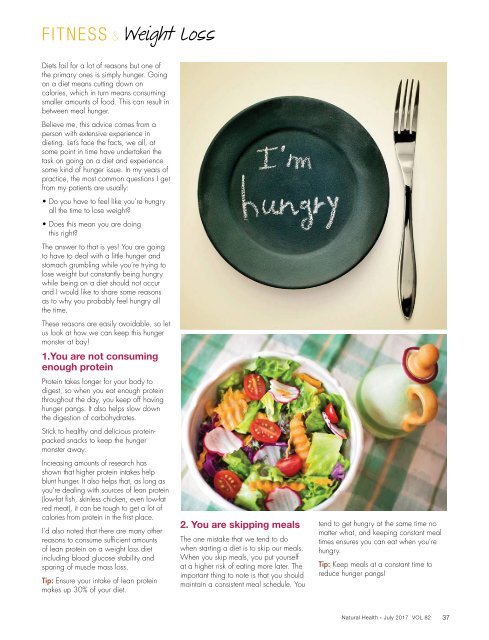Natural Health July 2017
You also want an ePaper? Increase the reach of your titles
YUMPU automatically turns print PDFs into web optimized ePapers that Google loves.
FITNESS & Weight Loss<br />
Diets fail for a lot of reasons but one of<br />
the primary ones is simply hunger. Going<br />
on a diet means cutting down on<br />
calories, which in turn means consuming<br />
smaller amounts of food. This can result in<br />
between meal hunger.<br />
Believe me, this advice comes from a<br />
person with extensive experience in<br />
dieting. Let’s face the facts, we all, at<br />
some point in time have undertaken the<br />
task on going on a diet and experience<br />
some kind of hunger issue. In my years of<br />
practice, the most common questions I get<br />
from my patients are usually:<br />
• Do you have to feel like you’re hungry<br />
all the time to lose weight?<br />
• Does this mean you are doing<br />
this right?<br />
The answer to that is yes! You are going<br />
to have to deal with a little hunger and<br />
stomach grumbling while you’re trying to<br />
lose weight but constantly being hungry<br />
while being on a diet should not occur<br />
and I would like to share some reasons<br />
as to why you probably feel hungry all<br />
the time.<br />
These reasons are easily avoidable, so let<br />
us look at how we can keep this hunger<br />
monster at bay!<br />
1.You are not consuming<br />
enough protein<br />
Protein takes longer for your body to<br />
digest, so when you eat enough protein<br />
throughout the day, you keep off having<br />
hunger pangs. It also helps slow down<br />
the digestion of carbohydrates.<br />
Stick to healthy and delicious proteinpacked<br />
snacks to keep the hunger<br />
monster away.<br />
Increasing amounts of research has<br />
shown that higher protein intakes help<br />
blunt hunger. It also helps that, as long as<br />
you’re dealing with sources of lean protein<br />
(low-fat fish, skinless chicken, even low-fat<br />
red meat), it can be tough to get a lot of<br />
calories from protein in the first place.<br />
I’d also noted that there are many other<br />
reasons to consume sufficient amounts<br />
of lean protein on a weight loss diet<br />
including blood glucose stability and<br />
sparing of muscle mass loss.<br />
Tip: Ensure your intake of lean protein<br />
makes up 30% of your diet.<br />
2. You are skipping meals<br />
The one mistake that we tend to do<br />
when starting a diet is to skip our meals.<br />
When you skip meals, you put yourself<br />
at a higher risk of eating more later. The<br />
important thing to note is that you should<br />
maintain a consistent meal schedule. You<br />
tend to get hungry at the same time no<br />
matter what, and keeping constant meal<br />
times ensures you can eat when you’re<br />
hungry.<br />
Tip: Keep meals at a constant time to<br />
reduce hunger pangs!<br />
<strong>Natural</strong> <strong>Health</strong> * <strong>July</strong> <strong>2017</strong> VOL 82<br />
37

















